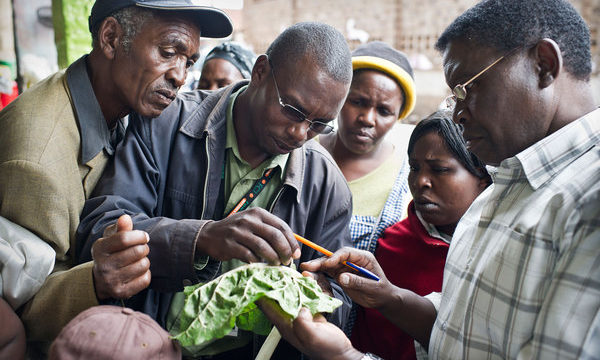 The power of data over our lives is hard to overestimate. It governs how we understand and interact with the modern world, how it is measured and controlled.
The power of data over our lives is hard to overestimate. It governs how we understand and interact with the modern world, how it is measured and controlled.
So, what is being done to utilise open data for global food security and nutrition?
When separated, the two words – ‘open’ and ‘data’ seem simple and innocuous, even dull sounding. In stark contrast, when combined to form ‘open data’ the ramifications for food security and nutrition are profound and revolutionary. In this brave new world data can be freely used, re-used and redistributed by anyone.
In the realm of food security and nutrition, open data can mean helping farmers forecast with weather apps and SMS with aWhere, boosting crop yields using a best practice Knowledge Bank with Plantwise and saving $3.6m in drought damage with a climate-smart tool from CIAT Colombia.
Eunice Boule, a rural small holder farmer in Kenya, embodies the potential of open data for promoting rural development. She uses a free app called Haller with easily digestible information on how to farm vegetables better. She can now grow more crops and afford to send her children to school. The positive impact on her livelihood has encouraged her to spread the word and tell other farmers how they too can benefit from open data*.
The amounts of data now being generated in every field of inquiry are staggering. In just two years (2013 – 2015) more data was created than in the entire previous history of the human race, according to Forbes.
In an age of instant communication, made possible thanks to the likes of social media and mobile technologies, we are all aware of the problems with publishing freely online. Fake news, alternative facts, whatever you want to call it, our world is awash with unsubstantiated opinion.
Smallholder farmers cannot afford to be on the receiving end of poor data and false advice so open data in agriculture must ensure integrity and validity in what is published. It is therefore a huge responsibility for those in charge of data management to use it wisely and ethically.
Many democracies rely on a constitution to direct policies and protect citizen rights. Open data is embarking on a similar course with the Global Open Data for Agriculture and Nutrition initiative (GODAN) working on establishing a common policy and practice framework among donors. Its recommendations were launched in a report at CFS44 in Rome last week.
Democracy remains the best way humanity has devised in pursuing the fair sharing of power and responsibility. By allowing every smallholder farmer to use and create innovations through open data, everyone stands to gain. However, the urgency to do this should not gloss over the necessary step of reaching a consensus on what form a democratised open data landscape should take.
*Example taken from OPEN FIELDS – GODAN Documentary Web Series – Ep. 2
Related News & Blogs
Enabling Data Access Project: Supporting Grantmakers and Digital Capabilities in India and Ethiopia
(Image by Kevin Ku, Pexels) The Enabling Data Access project, funded by the Bill & Melinda Gates Foundation aims to support the improved design of grants with data components in collaboration with the Open Data Institute (ODI). The c…
23 August 2021



